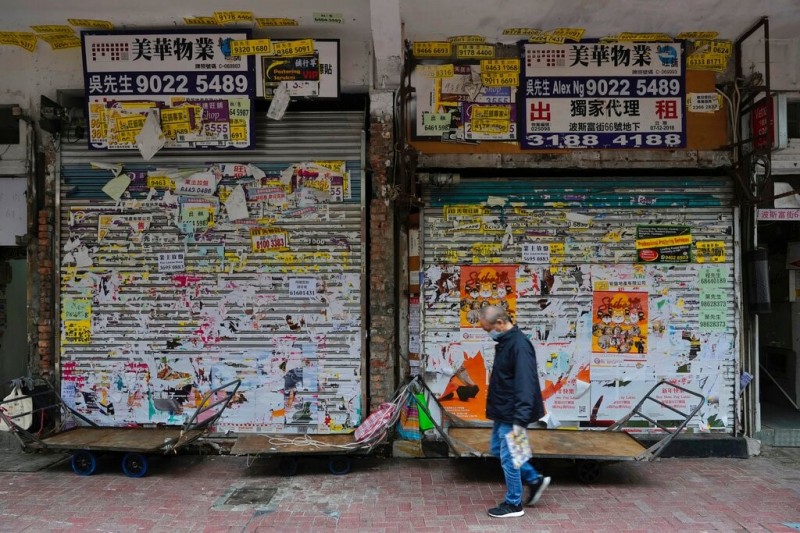
HONG KONG: Jessica Kong has kept her Hong Kong bubble tea shop afloat through two years of the Covid-19 pandemic, but painful restrictions to battle the city’s worst outbreak have finally dealt her business a fatal blow.
Sales at Kong’s soon-to-be-closed RoyalTea plunged by half, as soaring prices for milk — a key ingredient in the popular drink — and some of the world’s highest commercial rent prices forced her to concede defeat.
“Am I making any money? Definitely not. I’m just managing to pay my staff and rent,” said Kong, who pays HK$78,000 (US$10,000) a month in rent.
The shop’s imminent closure, along with scores of other shuttered businesses, has deepened fears about Hong Kong’s economy as strict social-distancing measures turn the financial hub’s busiest shopping and nightlife venues into ghost towns.
Two cinemas closed their doors last week, a rotisserie franchise has shut for good and a handful of the city’s longest-operating banquet restaurants also announced their final days in business.
Hundreds of small businesses could close in the next few months and the government’s latest round of HK$27 billion in virus relief will do little to ease the pain, said Danny Lau, chairman of the Hong Kong Small and Medium Enterprise Association.
“Those who were able to survive last year are unlikely to survive this time around,” he added, and called for an easing of restrictions.
“It’s the only option now really. There is no possible way we can keep going.”
It is not just a lack of customers. Operating costs are also skyrocketing, said Laura Offe, co-founder of Meraki Hospitality, which runs Middle Eastern restaurant Bedu and Brazilian-Japanese outlet Uma Nota.
Meat import costs are up 50% while the flow of key ingredients into the city has been squeezed by a clampdown on cargo arrivals, she said.
“Every day is doom and gloom. We don’t know when this is going to end,” said Offe.
Hong Kong made it through the worst of the pandemic relatively unscathed with a zero-Covid strategy that effectively shut the city of 7.4 million off from the outside world.
Flights were severely restricted and visitors had to spend three weeks in quarantine before they could set foot in the territory.
But now, Hong Kong is buckling under the weight of the highly-contagious omicron variant.
Daily coronavirus cases on Monday surged to over 7,500 cases for the first time with 13 deaths, flooding hospitals with patients, many of them elderly. Images of ill people shivering on gurneys outside public wards have sparked anger at the government for not having a backup plan to deal with a severe outbreak.
Hong Kong’s increasingly unpopular leader Carrie Lam earlier ordered the closure of gyms, spas, bars and other venues, and restaurants can no longer accept diners after 6pm. Public gatherings are limited to two people in a bid to limit pedestrian traffic.
But cases have continued to spike, and the government has gone further by closing hair salons and religious venues. It also banned more than two families from gathering in a private space.
For many, patience is wearing thin with Hong Kong’s “dynamic Covid-zero strategy”.
“It’s more like they’re aiming for a zero-business strategy,” said one hot-pot restaurant owner.
Hong Kong broke out of a two-year recession in 2021 when the economy expanded 6.4% on the back of stronger household spending.
On Monday, November to January unemployment figures showed that the jobless rate remained steady at 3.9%, but there are fears that the city’s rebound won’t stick.
“The pressure is now higher as the cyclical recovery of domestic consumer spending may have peaked and can only head south with strict mobility restrictions,” Alicia Garcia Herrero, Asia-Pacific chief economist at asset manager Natixis, said in a report.
Credit rating agency Fitch halved its 2022 GDP forecast for Hong Kong to 1.5%, citing social-distancing restrictions and uncertainty surrounding plans to contain the latest wave. The Hong Kong General Chamber of Commerce is expecting just 1.2% growth this year.
“The jobs market will remain fragile, so there is a pessimistic outlook for catering businesses and other retail sales,” Iris Pang, lNG’s chief economist for greater China, wrote in a research note.
The business community is keeping a close eye on this week’s budget for signs of more financial aid, in addition to some HK$231 billion already rolled out for employers and staff hit by virus restrictions.
But what operators need most is clarity about how long the measures may last, said Lau of the small business association.
“The worst is that we can’t see what lies ahead,” he said.
“If they just tell us two months, three months or six months at least then we can make plans.”
Source: https://www.freemalaysiatoday.com/category/world/2022/02/22/hong-kongs-zero-business-covid-rules-sink-small-operators/

